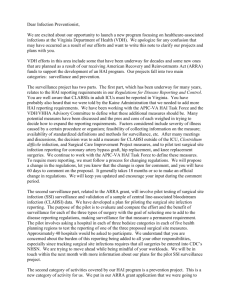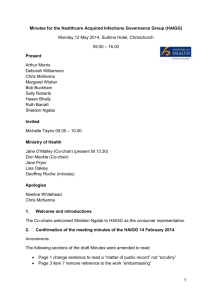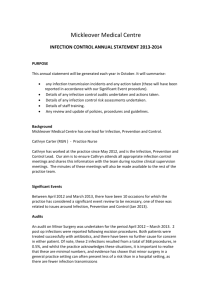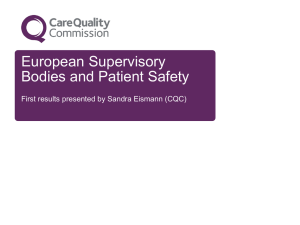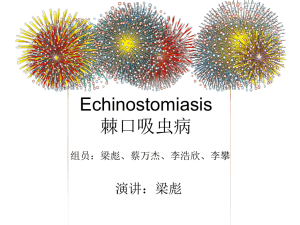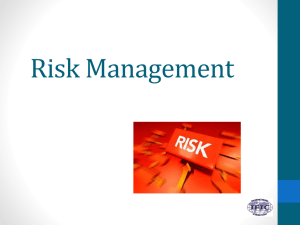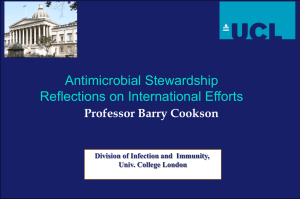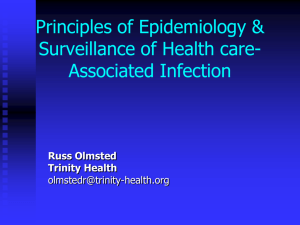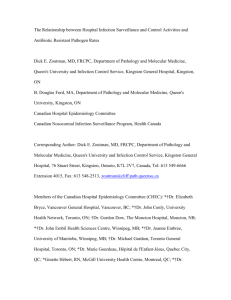VDH/VHHA Healthcare-Associated Infection Advisory Committee
advertisement
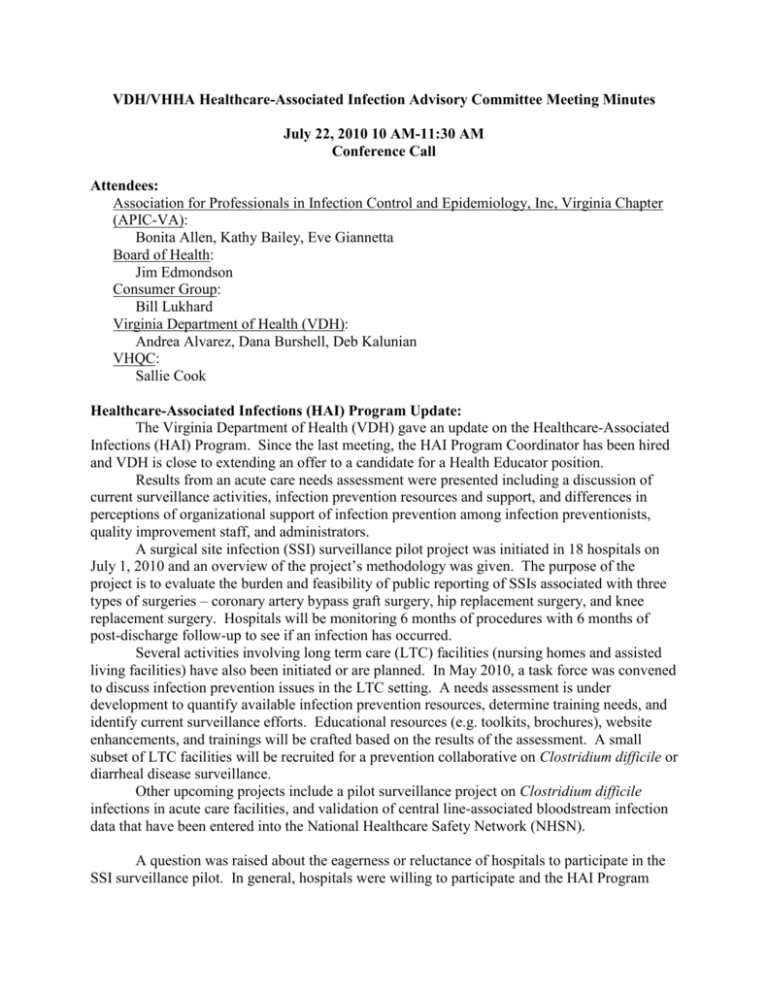
VDH/VHHA Healthcare-Associated Infection Advisory Committee Meeting Minutes July 22, 2010 10 AM-11:30 AM Conference Call Attendees: Association for Professionals in Infection Control and Epidemiology, Inc, Virginia Chapter (APIC-VA): Bonita Allen, Kathy Bailey, Eve Giannetta Board of Health: Jim Edmondson Consumer Group: Bill Lukhard Virginia Department of Health (VDH): Andrea Alvarez, Dana Burshell, Deb Kalunian VHQC: Sallie Cook Healthcare-Associated Infections (HAI) Program Update: The Virginia Department of Health (VDH) gave an update on the Healthcare-Associated Infections (HAI) Program. Since the last meeting, the HAI Program Coordinator has been hired and VDH is close to extending an offer to a candidate for a Health Educator position. Results from an acute care needs assessment were presented including a discussion of current surveillance activities, infection prevention resources and support, and differences in perceptions of organizational support of infection prevention among infection preventionists, quality improvement staff, and administrators. A surgical site infection (SSI) surveillance pilot project was initiated in 18 hospitals on July 1, 2010 and an overview of the project’s methodology was given. The purpose of the project is to evaluate the burden and feasibility of public reporting of SSIs associated with three types of surgeries – coronary artery bypass graft surgery, hip replacement surgery, and knee replacement surgery. Hospitals will be monitoring 6 months of procedures with 6 months of post-discharge follow-up to see if an infection has occurred. Several activities involving long term care (LTC) facilities (nursing homes and assisted living facilities) have also been initiated or are planned. In May 2010, a task force was convened to discuss infection prevention issues in the LTC setting. A needs assessment is under development to quantify available infection prevention resources, determine training needs, and identify current surveillance efforts. Educational resources (e.g. toolkits, brochures), website enhancements, and trainings will be crafted based on the results of the assessment. A small subset of LTC facilities will be recruited for a prevention collaborative on Clostridium difficile or diarrheal disease surveillance. Other upcoming projects include a pilot surveillance project on Clostridium difficile infections in acute care facilities, and validation of central line-associated bloodstream infection data that have been entered into the National Healthcare Safety Network (NHSN). A question was raised about the eagerness or reluctance of hospitals to participate in the SSI surveillance pilot. In general, hospitals were willing to participate and the HAI Program Coordinator spoke on the phone with all hospitals to answer any questions prior to the hospital formally consenting to participate in the pilot. Another question was asked regarding the time horizon for broadening HAI public reporting. VDH noted that there is no concrete timeline for increasing measures but in April 2010, the Board of Health approved proceeding with requiring reporting of three additional measures: 1) Central line-associated bloodstream infections in two units outside the adult ICU; 2) Laboratory-identified Clostridium difficile infection; and 3) Surgical Care Improvement Project (SCIP) measures specific to coronary artery bypass graft (CABG), hip arthroplasty, and knee arthroplasty surgeries. Additional SSI measures may be proposed based on the results of the pilot surveillance project. VDH was encouraged to develop an implementation strategy and set goals for reporting because often, infections have to be mandated for hospitals to do the surveillance. APIC National Conference Update: Several infection preventionists attended the annual APIC conference in July 2010 and discussed a few topics of interest. The Centers for Medicare and Medicaid Services (CMS) is working on hospitals reporting HAI indicators directly to them for a variety of measures. Initially, CMS will pay for receiving data and then will pay for performance. Discussions about NHSN’s surgical site infection definitions also took place but the infection preventionists were unable to resolve the confusion with the definitions that had first emerged at the SSI surveillance pilot training in June 2010. VHQC Update: Sallie Cook from VHQC, the Medicare QIO (quality improvement organization), described progress on two major projects. Currently, 13 hospitals are submitting data for a project on methicillin-resistant Staphylococcus aureus (MRSA). The participating hospitals are showing improvement in their MRSA infection rates for the selected unit under surveillance. The other VHQC project focuses on SCIP process measures. The 16 participating hospitals are collecting 8 measures on various types of surgeries. Individual measures as well as composite measures (patient received all 8 measures) have shown improvement from the first quarter of 2007 to the fourth quarter of 2009. Performance on these measures has been shared with the hospitals. The next Advisory Committee meeting is planned for December 2010.
